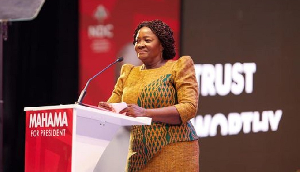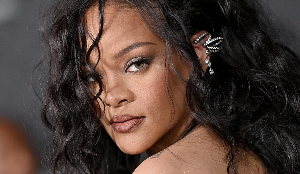- Home - Sports
- Soccer Portal
- Archived Sports News
- Sports Videos | TV
- Year In Review
- Sports Photos
- Sports Headlines
- Boxing
- Athletics
- Basketball
- Bodybuilding
- Cricket
- Golf
- Handball
- Hockey
- Martial Arts
- Tennis
- Volleyball
- Other Sports

Sports Features of Wednesday, 28 February 2007
Source: GNA
What fate awaits the Black Stars at CAN 2008
A GNA feature by Stephen Asante
Kumasi, Feb 28, GNA - One significant feature about the British colonial rule over Ghana was the introduction of football into the country that has now become a passion of the independent nation. Even though there is still controversy about the particular location in which the sport was introduced into the country, statistics made available to the GNA Sports by the Ghana Football Association (GFA) indicates that the sport was not all that popular until the early 1900s when many residents of the then Gold Coast started patronizing the sport.
The early parts of the 20th century saw the formation of football Clubs like Accra Hearts of Oak, Kumasi Asante Kotoko, Kumasi Cornerstone, Cape Coast Mysterious Dwarfs, Sekondi Eleven Wise, Dynamos, Sekondi Hasaacas, Accra great Olympics, Venomous Vipers, Brong Ahafo United, Gbewa United and Savanna Stars among others who engaged themselves in league matches and other competitive games under the then Amateur Football Association.
These matches, according to the GFA were designed primarily to whip up the interest of the sport among the citizenry across the length and breadth of the country.
However, soon after Ghana gained independence in 1957 and most especially in the early 60s, football became the most popular sporting activity in the country as a result of the comprehensive measures and interest shown by Dr Kwame Nkrumah, the then President by instituting measures to accelerate the development of the sport in the country.
In the words of Joe De-Graft, a former player of the senior national team, the Black Stars, 93Dr Nkrumah was so keen about the game and the prospects it had in advancing the noble cause of the nation that he worked in close collaboration with the late Ohene Djan, the then Director of Sports as well as football administrators to develop the sport to an appreciable level".
De-Graft, 70, and a member of the 1963 Black Stars' squad that won the nation's first African Cup of Nations (CAN) competition, told the GNA Sports that, 93Morale in camp was always very high as the President gave us all the motivation we needed to boost our performance and confidence".
Other players who also contributed to the Stars' first Nation's Cup triumph under the guidance of coach Joseph Ember include the late Baba Yara, Addo Odamtten, Dodoo Ankrah, Wilberforce Mfum, Ben Acheampong, Aggrey Fynn and Dogo Moro among others.
It must be noted that aside 1963 history repeating itself two years later when the Stars successfully defended the Cup they won on their home soil with another triumph in far away Tunisia, as they made it as the second national team after the Pharaoh's of Egypt to have won the Nation's Cup for two consecutive times.
There were also successes for the national team in 1978 and 82 when the Black Stars annexed the Nation's Cup in Ghana and Libya respectively to become the first nation on the African continent to have won the Cup in four occasions.
Surprisingly, since 1982 to date the national team has virtually gone to 91sleep' as it had tried in vain to win the Cup and thus regain its enviable status in African football.
The last time Ghana came close to winning the Cup was in 1992 when the Black Stars lost the final match to the Elephants of Cote d'Ivoire in a tournament hosted in Senegal.
Football analysts have attributed Ghana's inconsistency at the Nation's Cup tournament to poor preparation, apathy towards the senior national team by players and administrators, lapses in football administration and fre quent changes in coaches and players and non-commitment.
Due to poor preparation, for instance, the national team between 1984 and 92 failed to qualify for the Nation's Cup whilst in cases where they qualified their performance was nothing to write home about. It is worth noting that the performance of the team at a point in time degenerated so much that many Ghanaians were compelled to lose enthusiasm and confidence for the Black Stars.
Perhaps it is now very obvious that the days when the nation prided itself as having won the Nation's Cup on four occasions are over as that record has been equaled by Cameroon with victories coming their way in 1984, 1988, 2000 and 2002, whiles Egypt is now on record to have won the most Cups 96 five times, with victories coming their way in 1957, 59, 86, 98 and 2006.
The African Nations Cup is without doubt the greatest sporting spectacle on the continent that has gradually come of age. It is against this backdrop that stakeholders in Ghana football should embark on a collaborative and conscious effort aimed at enabling the Black Stars to win its fifth Cup now that the nation has won the bid to host the Ghana CAN 2008.
Undoubtedly the 26th edition of the Nations Cup which would be held in the early part of next year in four match venues have come at a time when the national team are enjoying some sort of consistency following their exploits at last year's World Cup Championship held in Germany.
Due to the prudent and pragmatic measures instituted by the present administration, the Black Stars has seen a tremendous improvement in its performance as was manifested in the latest world football governing body, FIFA's rankings which has placed Ghana in the third position in the African rankings and 22nd in the world rankings. In skipper Stephen Appiah, midfield dynamo Michael Essien, John Mensah, Asamoah Gyan, Shilla Illiasu, Sule Ali Muntari, Junior Agogo and the Kingston brothers, the nation seem to have the crop of players capable of restoring to the nation its rightful place in African football and the world in general.
There is however the need for us as a nation to go beyond the gains made so far and look forward to putting in place a sustained development plan that would ensure total sanity in football administration in the country at both the local and national level. There must be a serious campaign against illegal sale of players, superstition, bribery, hooliganism, player indiscipline and poor remuneration for players while serious consideration must be given to the upgrading of sports fields and construction of stadiums in all regional capitals as started by the Acheampong regime to help improve the performance of our players.
Football administrators and team managers should resolve to work in collaboration with corporate bodies to inject the necessary investment into their respective Clubs so that players' remuneration are enhanced with the view to retaining good players on the local scene for a longer period of time for the long-term benefit of the Black Stars.
History had proven that the national team always performs better at competitions whenever it has a blend of foreign and locally based players.
For example at the Senegal CAN 9192, the Black Stars was adjudged to have played one of the finest games throughout the tournament as the team had a good blend of players with the likes of skipper Abedi Pele, Tony Yeboah, Prince Opoku, Ali Ibrahim and Odartey Lamptey, who were all foreign-based players alongside with local players like Emmanuel Ampiah, Emmanuel Armah, Edward Ansah, Stanley Aboraa and Frimpong-Manso among others.
Again, the inclusion of Shilla Illiasu, Habib Mohammed and Issah Ahmed, all then local players in the Stars' squad that participated in last year's World Cup Championship proved timely and fruitful as they helped in tightening Ghana's weak defence.
In view of the fact that football has become a big marketing commodity and powerful tool that has the potential to generate employment, create wealth and also promote peace, there is the need for the GFA to step up its efforts geared towards enabling the national team to translate its consistent performance into the CAN 2008.
In an interview with the GNA Sports in Kumasi recently, Anthony K. Adusei, a member of the technical team of the Stars' squad that won silver in the Nations Cup in Senegal in 1992, identified complacency as the main factor that could affect the team's bid to annex its fifth Cup if the players are not properly psyched up.
"The Stars should ensure that their exploits at the World Cup championship in Germany and the string of successes they are chalking in friendly matches do not get into their heads since the African Cup of Nations tournament is a different ball game altogether", he said. One of the pillars upon which the FA intends to reconstruct Ghana football includes building a robust, marketing-oriented and top quality brand of our own indigenous football.
CAN 2008 therefore presents a fine opportunity and platform for the realization of this dream if we set our priorities right. Indeed, the Black Stars have come a long way in its quest to win its fifth Nations Cup and now that Ghana is celebrating her 50th independence anniversary there could not have been a more appropriate time for the Stars to break the 25-year-old jinx than the CAN 2008 when the team takes on some of Africa's football powerhouses under the very eyes of their numerous passionate home supporters.
Entertainment









